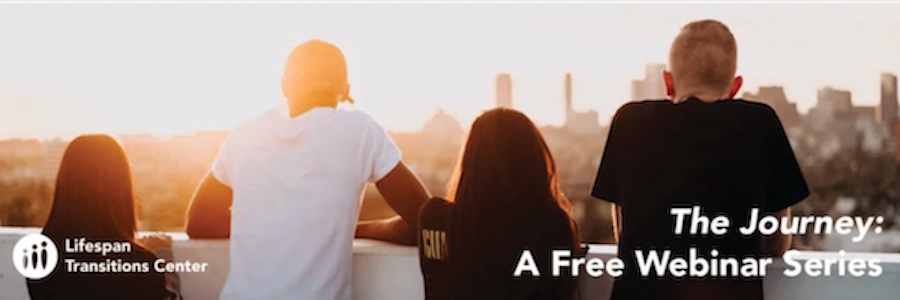May 2022
Thank You
These last two school years have been tough on everyone. It has been a difficult time to plan for a student’s future that seemed unknown and ever-changing all at once. We became familiar with terms like ‘contact tracing’ and ‘quarantine timelines’. We recognize the additional uncertainties and stress they have caused on our families, students, educators, and other transition professionals. We hope you have plans to center yourself around family, friends, and hobbies over the summer. While we don’t know what next school year will bring, we know we can take efforts to re-charge ourselves and fill our cups.
The Lifespan Transitions Center team at OCALI has truly enjoyed working through these last two school years together—whether it be coaching teams through projects, connecting during online learning, and finally those face-to-face connections the last months. Thank you for your persistence and perseverance to support families and students in these times. Thank you for time spent being creative, thoughtful, and passionate about your work. We hope you’ll return to partner with us on new tools, virtual webinars, and (fingers crossed) in-person meetings next school year. We can’t wait to see you!

NEW: Age-Appropriate Transition Assessment (AATA) Planning Guide for Multi-Agency Professionals
Our new online AATA Tool will introduce you to the planning process for transition assessment. It is important our multi-agency teams intentionally plan for transition assessment to ensure we reduce duplication, build on a student’s progress, and identify individualized assessment to build the youth’s profile in relationship to those skills needed for their adult life goals.
NEW: Take 5 Videos
-
Using Backwards Planning in the Transition Planning Process:
Planning for a future adult life is critical. Using Backwards Planning as the foundation for that process can enhance the success of the plan. In both Backwards Thinking and Backwards Planning, you begin with the vision or goals for the future adult life as well as the skills and knowledge that will need to be in place to be able to achieve those goals and work through “The Gap.”
-
Residential Options in the DD System:
Learn about the eligibility-based housing options in your community offered through the County Board of Developmental Disability Services! Topics covered will include waivers, intermediate care facility, congregate living, shared living, and drop-in services.
-
Inquire about the unique housing options in your community! Build confidence when you hear the words ow-income Housing Tax Credit (LIHTC) properties, or Housing Choice Voucher Program (HCVP) versus public housing, and housing authority.
Congratulations 2023 Graduates!
Congratulations to all the graduates of the Class of 2023, and congratulations to family members, educators, counselors, SSAs, and everyone else who helped students this year and all of their educational years to prepare for adulthood. Your work and support of these graduates was vital in their learning and preparation.

Register Now: May 23, 2:30 p.m.
Transition Planning for the Whole Person: An Individualized Journey
Transitioning to adult life requires planning for more than just postsecondary education and employment. All life domains need to be considered when developing the vision and support plan for a student’s desired adult life. DODD Community Life Engagement Project Managers will demonstrate how Charting the LifeCourse can be used as a guide to look at all aspects of a student’s life and will discuss how to identify resources and supports to achieve desired outcomes. Learn more and register.
Recordings Available
In case you missed it.. we archive all of our Journey webinars so you can watch them later on demand. Looking to find out more information in a certain area? Bringing together your team for some staff development? Look at some of our past webinars for great ways to support students and families.
Exploring the Myth of Hard-to-Reach Families
Family engagement must be intentional and inclusive to reach all of the families we work and serve. With that in mind, there are times where schools have trouble connecting with some families, leading educators to believe that thin that these families are “hard-to-reach” or not engaged in their child’s learning. This webinar discusses the “myth of hard-to-reach families”, as proposed by Dr. Karen Mapp and Dr. Soo Hong, and core beliefs to move past that myth. Watch Recording.
Functional Behavior Assessment for Youth with Complex Needs – Beyond A-B-C
Youth with complex and intensive needs often present with distressed behaviors that are difficult to understand. A Functional Behavior Assessment or FBA is helpful to determine the root cause of these distressed behaviors, however, the assessment must take into multiple factors . Join us for a discussion of the type of FBA that goes below the surface and beyond the typical Antecedent-Behavior-Consequence model. Resources to assist in this process will be introduced. Watch Recording.
What Educators Need (and Want) to Know About Medications
Many youth today are using medications to assist in their ability to function more successfully in the home, school and community. While medications can be a positive support for learning and participating in school activities, side effects can occur that range from mild discomfort to very serious. It is important for educators to understand the intended positive outcomes of medication use, as well as the unintended side effects that can occur. Dr. Sara Dugan offers insights into frequently prescribed medications and what teachers should be aware of as they teach and support students using these medications. Watch Recording.
What I Wish I Knew Then - Parent Perspective Following High School
Parents of young adults with complex support needs offer insights and considerations after experiencing life after high school. This panel discussion is an authentic dialogue providing educators, SSAs, OOD counselors, families and others awareness of what was most helpful during the school years and what else might have been more helpful in order to prepare for the future. Watch Recording.
Assistive Technology and Youth With Complex Support Needs - Resources and Considerations
Ever wonder if the students you support could benefit from AT? Do you have a student who uses AT currently or used AT in the past and it no longer seems to provide the needed support? This webinar will provide an overview of AT with a focus on transition age students with the most complex needs. Resources will be provided to expand your knowledge on how to consider, assess, and implement AT. Participants will also learn about a free AT virtual training program and other opportunities provided specifically for Ohio county board of developmental disability staff by the AT&AEM Center, funded by the Ohio Developmental Disabilities Council under the Developmental Disabilities Assistance and Bill of Rights Act. Watch Recording..